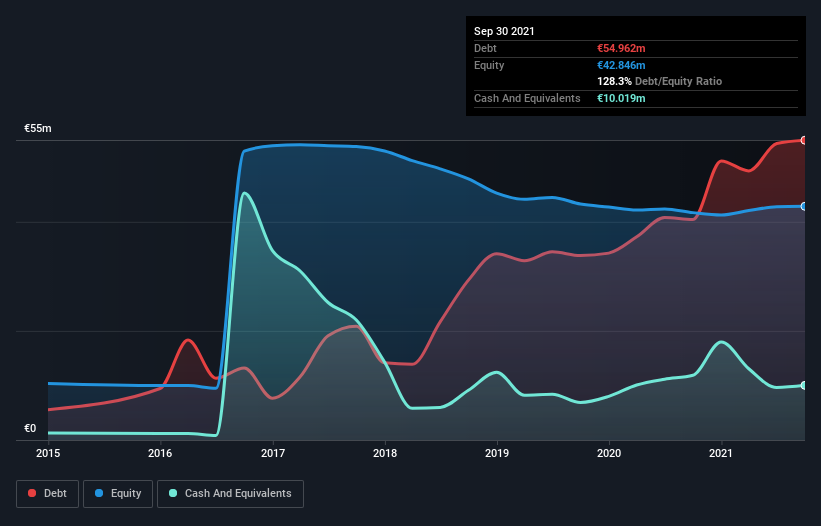
Howard Marks put it nicely when he said that, rather than worrying about share price volatility, 'The possibility of permanent loss is the risk I worry about... and every practical investor I know worries about.' It's only natural to consider a company's balance sheet when you examine how risky it is, since debt is often involved when a business collapses. Importantly, va-Q-tec AG (ETR:VQT) does carry debt. But the real question is whether this debt is making the company risky.
When Is Debt Dangerous?
Generally speaking, debt only becomes a real problem when a company can't easily pay it off, either by raising capital or with its own cash flow. If things get really bad, the lenders can take control of the business. While that is not too common, we often do see indebted companies permanently diluting shareholders because lenders force them to raise capital at a distressed price. Of course, plenty of companies use debt to fund growth, without any negative consequences. The first thing to do when considering how much debt a business uses is to look at its cash and debt together.
View our latest analysis for va-Q-tec
How Much Debt Does va-Q-tec Carry?
You can click the graphic below for the historical numbers, but it shows that as of September 2021 va-Q-tec had €55.0m of debt, an increase on €40.4m, over one year. On the flip side, it has €10.0m in cash leading to net debt of about €44.9m.

How Strong Is va-Q-tec's Balance Sheet?
The latest balance sheet data shows that va-Q-tec had liabilities of €36.3m due within a year, and liabilities of €52.6m falling due after that. Offsetting this, it had €10.0m in cash and €9.42m in receivables that were due within 12 months. So its liabilities outweigh the sum of its cash and (near-term) receivables by €69.5m.
va-Q-tec has a market capitalization of €327.3m, so it could very likely raise cash to ameliorate its balance sheet, if the need arose. But it's clear that we should definitely closely examine whether it can manage its debt without dilution.
We measure a company's debt load relative to its earnings power by looking at its net debt divided by its earnings before interest, tax, depreciation, and amortization (EBITDA) and by calculating how easily its earnings before interest and tax (EBIT) cover its interest expense (interest cover). Thus we consider debt relative to earnings both with and without depreciation and amortization expenses.
Weak interest cover of 0.39 times and a disturbingly high net debt to EBITDA ratio of 6.6 hit our confidence in va-Q-tec like a one-two punch to the gut. This means we'd consider it to have a heavy debt load. However, the silver lining was that va-Q-tec achieved a positive EBIT of €826k in the last twelve months, an improvement on the prior year's loss. When analysing debt levels, the balance sheet is the obvious place to start. But ultimately the future profitability of the business will decide if va-Q-tec can strengthen its balance sheet over time. So if you want to see what the professionals think, you might find this free report on analyst profit forecasts to be interesting.
Finally, a company can only pay off debt with cold hard cash, not accounting profits. So it is important to check how much of its earnings before interest and tax (EBIT) converts to actual free cash flow. During the last year, va-Q-tec burned a lot of cash. While that may be a result of expenditure for growth, it does make the debt far more risky.
Our View
To be frank both va-Q-tec's interest cover and its track record of converting EBIT to free cash flow make us rather uncomfortable with its debt levels. But at least its level of total liabilities is not so bad. Overall, we think it's fair to say that va-Q-tec has enough debt that there are some real risks around the balance sheet. If everything goes well that may pay off but the downside of this debt is a greater risk of permanent losses. There's no doubt that we learn most about debt from the balance sheet. But ultimately, every company can contain risks that exist outside of the balance sheet. To that end, you should learn about the 4 warning signs we've spotted with va-Q-tec (including 2 which are a bit concerning) .
If, after all that, you're more interested in a fast growing company with a rock-solid balance sheet, then check out our list of net cash growth stocks without delay.
New: AI Stock Screener & Alerts
Our new AI Stock Screener scans the market every day to uncover opportunities.
• Dividend Powerhouses (3%+ Yield)
• Undervalued Small Caps with Insider Buying
• High growth Tech and AI Companies
Or build your own from over 50 metrics.
Have feedback on this article? Concerned about the content? Get in touch with us directly. Alternatively, email editorial-team (at) simplywallst.com.
This article by Simply Wall St is general in nature. We provide commentary based on historical data and analyst forecasts only using an unbiased methodology and our articles are not intended to be financial advice. It does not constitute a recommendation to buy or sell any stock, and does not take account of your objectives, or your financial situation. We aim to bring you long-term focused analysis driven by fundamental data. Note that our analysis may not factor in the latest price-sensitive company announcements or qualitative material. Simply Wall St has no position in any stocks mentioned.
About XTRA:VQT
va-Q-tec
Develops, produces, and markets vacuum insulation panels and phase change materials in Germany, rest of European Union, and internationally.
Worrying balance sheet with weak fundamentals.
Market Insights
Community Narratives



